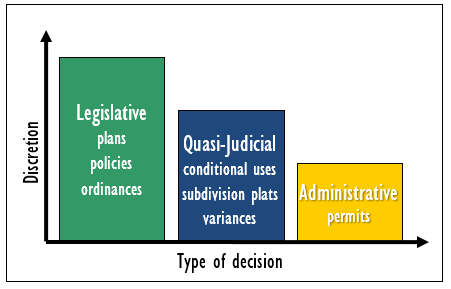Types of Decisions
Plan commissioners must distinguish between the roles they play in order to determine the rules that apply to their decisions. Local land use decisions can be separated into three general categories.
Legislative
 Legislative actions are those which result in policy-making. They affect the community as a whole rather than a small area or a few individuals. The adoption or amendment of plans and ordinances are legislative actions reserved by state law for the elected governing body. When the plan commission makes a recommendation to adopt or amend a plan or ordinance, it also acts in a legislative capacity. Legislative decision-makers are afforded a great deal of discretion. They are limited only by procedural and constitutional concerns. In most cases, they are required or encouraged to involve the public in helping to shape their decisions.
Legislative actions are those which result in policy-making. They affect the community as a whole rather than a small area or a few individuals. The adoption or amendment of plans and ordinances are legislative actions reserved by state law for the elected governing body. When the plan commission makes a recommendation to adopt or amend a plan or ordinance, it also acts in a legislative capacity. Legislative decision-makers are afforded a great deal of discretion. They are limited only by procedural and constitutional concerns. In most cases, they are required or encouraged to involve the public in helping to shape their decisions.
Quasi-judicial
Quasi-judicial decisions involve the application of rules and policies to the facts of a particular development proposal. The plan commission acts in a quasi-judicial manner when it considers conditional use permits, subdivision plats, variances to a subdivision ordinance, and other similar decisions. Quasi-judicial decisions involve the exercise of some discretion. For example, when deciding whether to grant a conditional use permit, the plan commission has the power to investigate facts, hold hearings, weigh evidence, draw conclusions, and use that information as a basis for their official decision. Discretion of quasi-judicial decision-makers is strictly limited by local ordinance and related state laws. Quasi-judicial decision-makers must apply the law as written and may not substitute their judgment for that of the governing body.
Administrative
Administrative or ministerial decisions involve the routine application of adopted rules and standards. Examples include the issuance of zoning permits (permitted uses), building permits and sign permits. Discretion associated with these types of decisions is very limited. In smaller communities, a commission member may actually perform the duties of a zoning administrator or building inspector by accepting petitions and applications, issuing permits and making inspections. This practice reflects the reality of limited personnel and financial resources in smaller communities.




